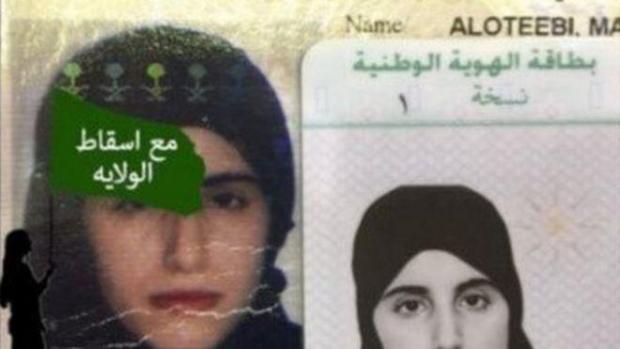2017-08-01 – On 31 July 2017, Saudi woman human rights defender Mariam Al-Otaibi was released from prison after more than 100 days. She immediately said in a tweet, “You can accomplish what your mind has prepared you for and what you have been able to do, just do not let others think you think you cannot 🙂 #Maryam_Free_Without a Guardian

Reports confirmed she has been released without the presence of a guardian. According to information received by the Gulf Centre for Human Rights (GCHR), Al-Otaibi has moved after her release to stay with her married sister in Riyadh, the capital.
The Guardianship system in Saudi Arabia has been used to jail women who refuse to be ruled by the male members of their families. In April, three feminist activists including Al-Otaibi were arrested under this system and jailed, and only one of them was released – Alaa Al-Anazi. News about feminist activist Dina Ali Lasloom is not available since her arrest on 13 April after she was deported from the Philippines, where she travelled alone. See: http://www.gc4hr.org/news/view/1567
Al-Otaibi was heavily involved in the campaign (#IAmMyOwnGuardian) to end the male guardianship system in Saudi Arabia and had sought protection from her family. See http://www.gc4hr.org/news/view/1501
On 15 April 2017, Al-Otaibi tweeted: “I will not go back to hell again even if I lose my life … Not only that, but Al-Ras police must be held accountable for plotting with my brother and father and direct conspiracy charges that are unfair and unjust …”
Subsequently, on 19 April 2017, Al-Otaibi was arrested after her father filed a complaint against her for being absent from the house, using the Guardianship system. She decided to move to Riyadh to work there and be independent in her life, but the Guardianship system can prevent her from doing so. After her arrest, she was transferred to the women’s section of Al-Malaz prison in Riyadh.
Under the guardianship system, her father has a right to file a case against her for leaving his house without his permission on charges known as “disobedience” in Saudi Arabia that warrant immediate detention of the accused. Her father’s claims caused her to spend over 100 days in Al-Malaz prison for women before her lawyer appealed for her release based on the lack of evidence for the charges.
While the GCHR welcomes the release of Mariam Al-Otaibi, it calls on the authorities in Saudi Arabia to respect women’s rights and recognise their potential to build a prosperous future for all citizens.
GCHR calls on the Saudi government to:
- Declare the status of feminist activist Dina Ali Lasloom and the measures taken to ensure her safety;
- Stop directing any form of harassment against Mariam Al-Otaibi and other women human rights defenders;
- Abolish the male-guardianship restrictions enforced on women citizens so they can enjoy their freedom of movement and access to travel documents in addition to the choice of residence and work; and
- Guarantee in all circumstances that all human rights defenders in Saudi Arabia are able to carry out their legitimate human rights activities without fear of reprisals and free of all restrictions including judicial harassment.
GCHR respectfully reminds the authorities in Saudi Arabia that the United Nations Declaration on the Right and Responsibility of Individuals, Groups and Organs of Society to Promote and Protect Universally Recognized Human Rights and Fundamental Freedoms, adopted by consensus by the UN General Assembly on 9 December 1998, recognises the legitimacy of the activities of human rights defenders, their right to freedom of association and to carry out their activities without fear of reprisals. We would particularly draw your attention to Article 5 (a): “For the purpose of promoting and protecting human rights and fundamental freedoms, everyone has the right, individually and in association with others, at the national and international levels: (a) To meet or assemble peacefully”, Article 6 (c): “Everyone has the right, individually and in association with others: (c) To study, discuss, form and hold opinions on the observance, both in law and in practice, of all human rights and fundamental freedoms and, through these and other appropriate means, to draw public attention to those matters“ and to Article 12 (2): “The State shall take all necessary measures to ensure the protection by the competent authorities of everyone, individually and in association with others, against any violence, threat, retaliation, de facto or de jure adverse discrimination, pressure or any other arbitrary action as a consequence of his or her legitimate exercise of the rights referred to in the present Declaration.”
Source: GCHR





